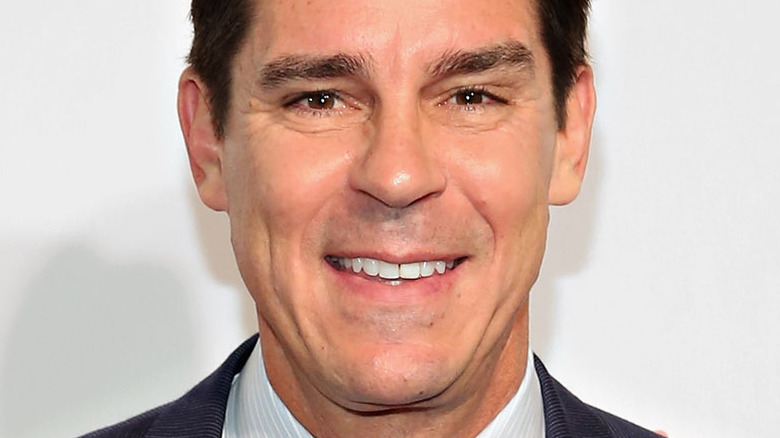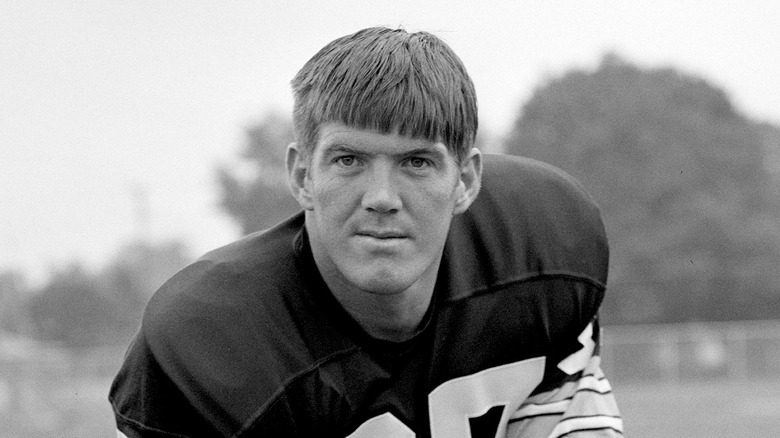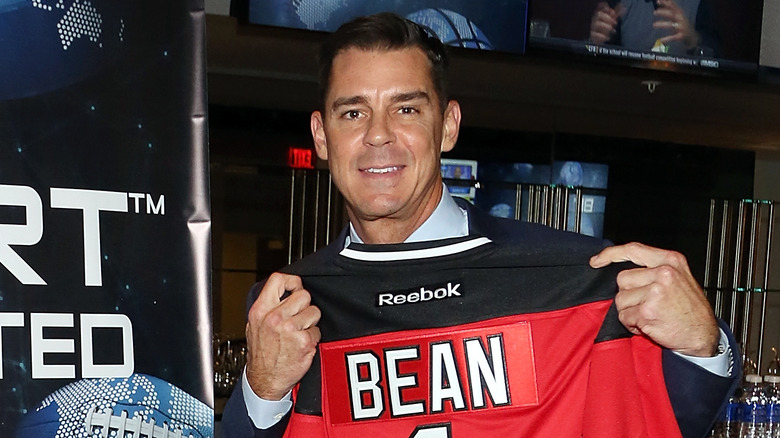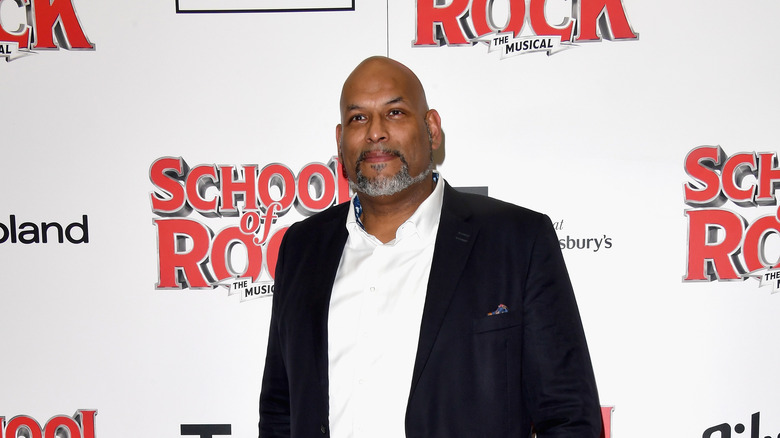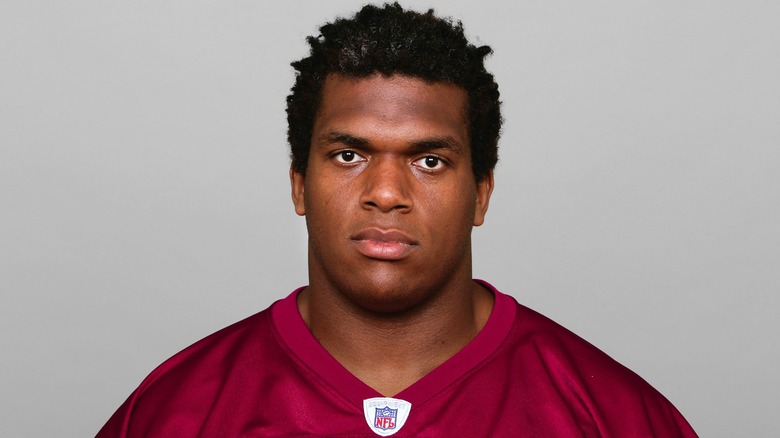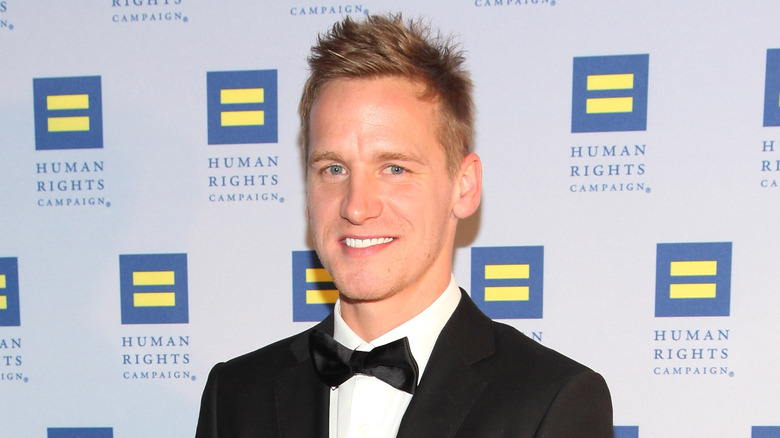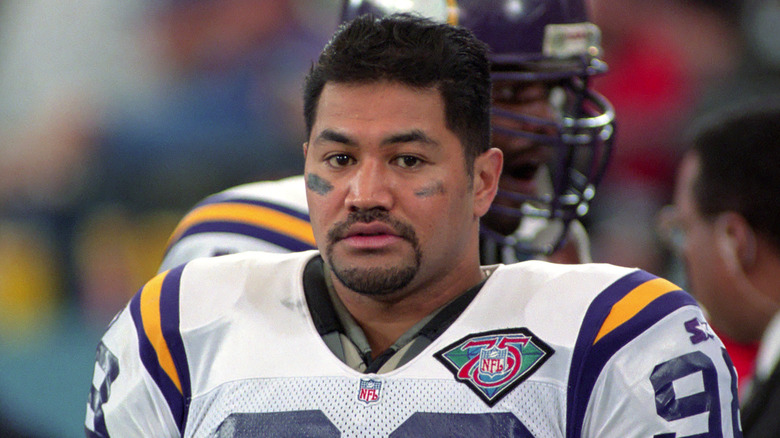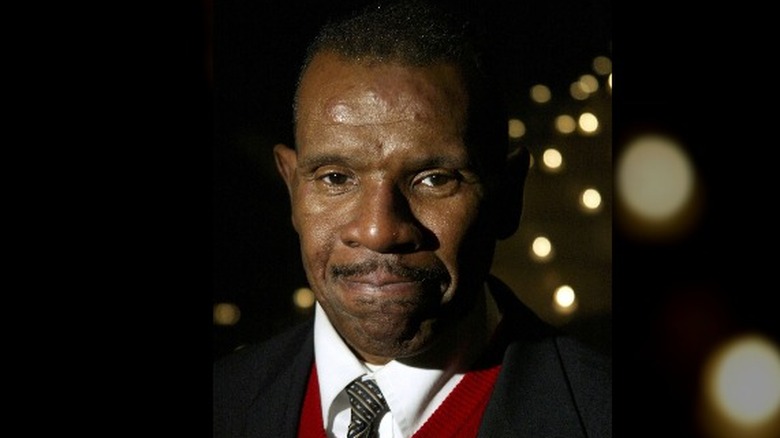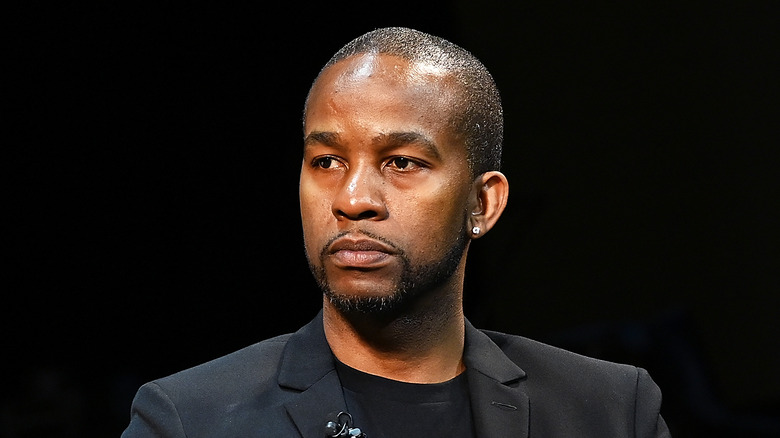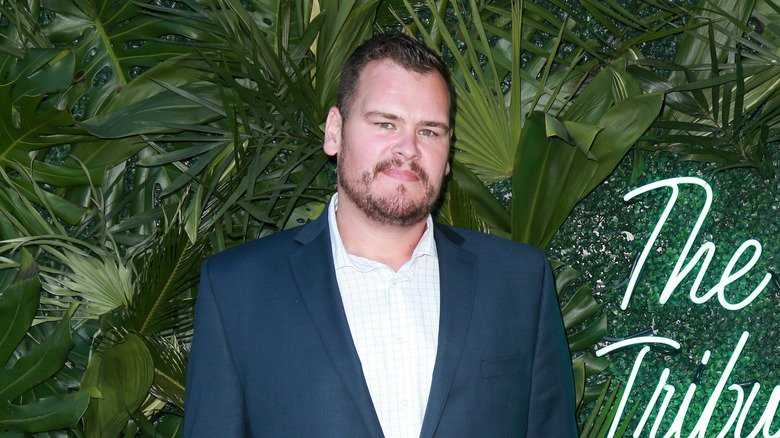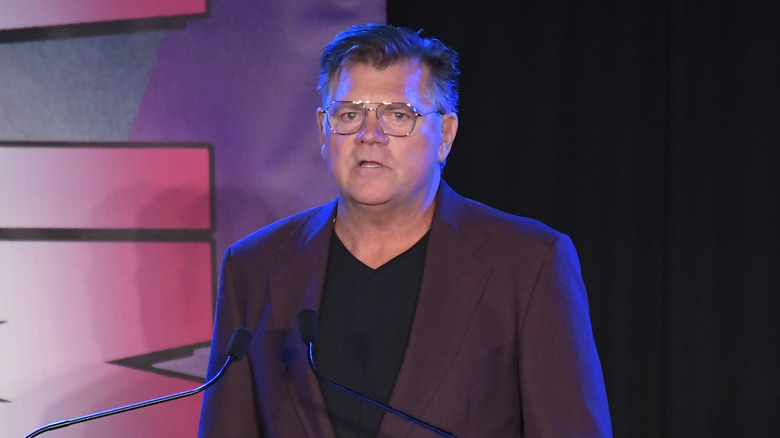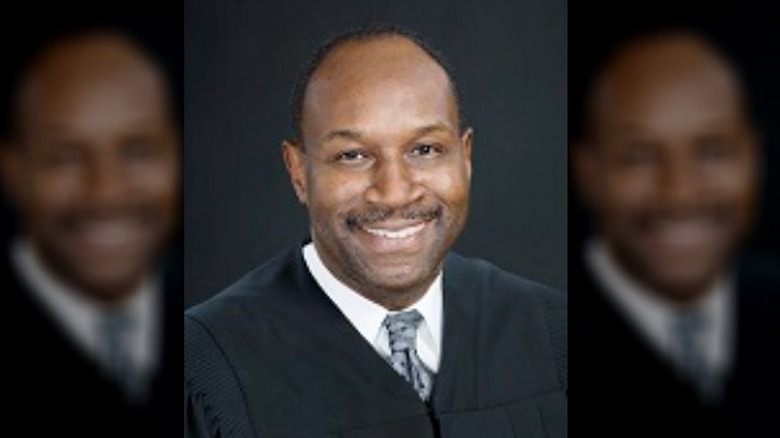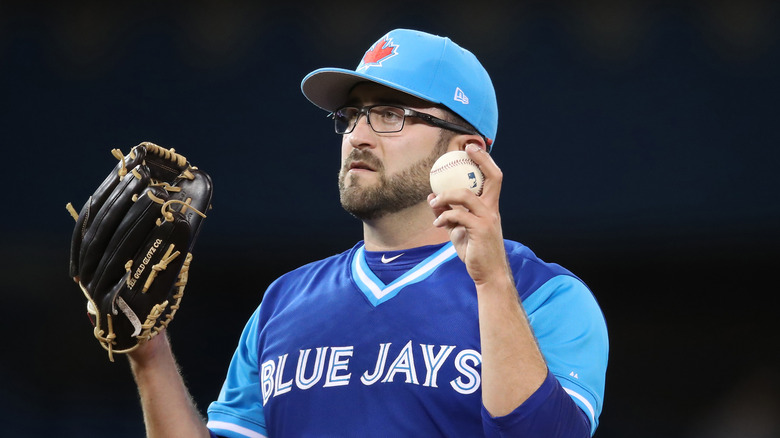13 Major League Athletes Who Came Out After Retiring
When Carl Nassib, then playing for the Las Vegas Raiders, came out as gay in June 2021, he became the first active openly gay player in the NFL's history, per The New York Times. While Nassib is the exception and not the norm for the major leagues, in recent years there has been progress among players in the minor league and in college who seem to be more comfortable sharing their sexuality. Take hockey player Brock McGillis, baseball player Solomon Bates, or footballer Mason Darrow — three of many brave athletes who have challenged team sports' culture of homophobia. We have also seen increased visibility of queer athletes in non-team sports, like pro skier Gus Kenworthy or skaters Adam Rippon and Johnny Weir.
Progress is also being made abroad, though again mostly at lower levels. Australia may be the exception, though, as it's home to Josh Cavallo — the only top-level out male soccer player in the world, per CNN — as well as Ian Roberts, a top-tier rugby player who came out in 1994, per ESPN, and major league basketball player Isaac Humphries. Compared to males, queer female athletes are practically commonplace, even in high-profile sports like basketball and soccer. From tennis legend Billie Jean King to the multiple lesbians leading American soccer, it has become acceptable to be an out female athlete. For men in the American major leagues, however, coming out remains a potential career killer, which may be why these athletes waited until their retirement to reveal their sexuality.
Dave Kopay
All of the men on this list are important in terms of queer history, but Dave Kopay has to be at the top of the heap. Per ESPN, Kopay was the first professional athlete to come out as gay in any team sport, which he did a few years after retiring from the National Football League (NFL). According to Out, Kopay played for five teams over the course of his NFL career, beginning with the San Francisco 49ers in 1964. He then went on to play for the Detroit Lions, Washington Redskins (now Commanders), New Orleans Saints, and Green Bay Packers (per ESPN), before retiring in 1972 after nine years in the league.
While Kopay was in the closet publicly during his tenure in the NFL, his sexuality became known within the sports world in the years that followed. According to GQ, Kopay was basically cut off from the industry and could not find a job coaching in the NFL or at the college level even before publicly declaring his sexual orientation. He took a huge step and came out in a Washington Star article in December 1975, per The Advocate. He decided to speak up after the newspaper received hate mail in the face of a previous article on a queer football player that relied upon an anonymous source, per The Washington Post. After that, Kopay appeared in The Advocate and, two years later, co-authored a book about his experience, "The David Kopay Story: An Extraordinary Self-revelation."
Jerry Smith
It is no coincidence that we are listing Jerry Smith directly after Dave Kopay, because not only were the two teammates on the Washington Redskins (now Commanders), but they also once slept together, per ESPN. In fact, that's how Kopay knew that Smith had been the anonymous source for the Washington Star article that prompted his own coming out interview, per GQ. Unlike Kopay, Smith never discussed being gay in public — despite it being somewhat of an open secret amongst many, per Sports Illustrated — not even in August 1986, when he revealed he had AIDS in an interview with The Washington Post. "Although Smith was willing to discuss his struggle with the disease, he would not elaborate on his life style," the article's author wrote. Smith died two months later at age 43, per the Free Lance-Star.
Smith played tight end for the Redskins for his entire NFL career, from 1965 to 1977, and was a gifted player. Per Sports Illustrated, he scored 60 touchdowns in his career, a record for the most touchdowns by a tight end at the time — and one he held for 27 years. Still, his sexuality has become just as much, if not more, a part of his legacy as his skill. And though he never came out to the world, Smith came out on a smaller scale after retirement. According to the Legacy Project, Smith even became co-owner of an Austin, Texas, gay bar, The Boathouse.
Billy Bean
Let's give football a break — for now — and turn to baseball, which has yet to see an openly gay active player at the top level. Nonetheless, there have been a few closeted players in Major League Baseball's (MLB) history who have been brave enough to come out after retirement. The first was Glenn Burke, who disclosed his homosexuality on an episode of "Today" and in a magazine article, both on the same day in 1982, three years after retiring from the league. But even though Burke was the first, the most notable player to come out is probably Billy Bean. Though his website says Bean is the only living openly gay person to have ever played in the MLB, T.J. House has since become the second.
Bean began his MLB career in 1987, playing for the Detroit Tigers, and also played for the San Diego Padres and the Los Angeles Dodgers, per The Advocate. He was demoted to the minors at one point, but made it back to the majors before leaving professional baseball completely in 1995. He casually came out in 1999, in a restaurant review for The Miami Herald, then hit the media circuit with interviews for major publications like The New York Times. A decade after publishing "Going the Other Way: Lessons From a Life in and Out of Major-League Baseball" in 2003, Bean became the MLB's Ambassador for Inclusion. He's currently the league's Senior Vice President of Diversity, Equity and Inclusion, per LinkedIn.
John Amaechi
When he came out in 2014, Jason Collins became the first openly gay player in the National Basketball Association's (NBA) history, per History.com. But he was not the NBA's first gay player, only its first one daring enough to come out amidst a culture — more generally and in sports, specifically — that is not always welcoming to queer people. One such player was John Amaechi, who started in the league in 1995 and became the first player to ever come out when he published his truth in his autobiography, "Man in the Middle," in 2007 (per The Guardian). According to The Guardian, Amaechi's public declaration of his sexuality was met with not just opposition but also death threats.
Though he is a trailblazer, Amaechi waited until after his playing career had ended to come out of the closet — and with good reason, given that he heard plenty of homophobic talk from teammates over the years, per Sportsnet. In total, Amaechi spent nine years playing in the big leagues, first for the Cleveland Cavaliers and then in Europe before moving back to the United States and playing for the Orlando Magic and the Utah Jazz, per The Guardian. He retired in 2003, after which he became a psychologist and founded his own company, APS Intelligence. So, why did he come out publicly? "You don't have a choice in being a role model — the only choice is whether to be a good or bad one," he once told Sports Illustrated.
Kwame Harris
Despite it being up there with hockey as one of the more violent of the big-name sports, more former NFL players have come out as queer than in any of the other major leagues. According to an article published by Outsports, as of September 2022, the NFL has seen 16 out gay or bisexual former players. This includes players who never made it into a major league game, but who attended training camp and, in the case of Colton Underwood and Michael Sam, made it onto a practice squad. Unlike Underwood and Sam, Kwame Harris made it into a regular season game, but whereas Sam came out before being drafted, Harris did not discuss his sexuality until after he was done playing football.
In fact, Harris did not originally come out by his own volition. The offensive tackle was outed after a physical altercation with a former boyfriend led to criminal charges, which then became public news, per ESPN. That occurred in 2013, years after Harris' time in the NFL. Harris played for the San Francisco 49ers and then the Oakland Raiders, spending six seasons in the league, per Bleacher Report. After his arrest, Harris officially came out in an interview with CNN, in which he talked about the struggles he faced while in the league. When asked if he had considered coming out while in the NFL, Harris said, "No, not while I was playing. I didn't see those two things as being compatible."
David Testo
Though Major League Soccer (MLS) is not nearly as popular as the "big four" leagues in North America — the NHL, NFL, NBA, and MLB — it's continued to grow and, according to Forbes, had its biggest year ever in 2022. As the top level for soccer in America, queer visibility in the MLS would be incredibly meaningful — especially considering how many queer female players have been out while actively playing American soccer (including Megan Rapinoe, Ashlyn Harris, and Abby Wombach). At the 2019 Women's World Cup, there were 40 — 40! — out LGBTQ players, per Outsports. And while we've not seen this much progress on the men's side, we'll take little victories.
One such victory is David Testo, an MLS player who bravely departed the closet once he stopped playing. According to SB Nation, Testo was dating men but still struggling with his sexuality when he joined the MLS in 2004. He played for the Columbus Crew for two years before they released him and he headed back to the minors. Testo came out in a 2011 interview with the CBC after retiring. "I'm gay. I didn't choose it. It's just part of who I am. And it has nothing to do with the talent of a soccer player," he said in the interview (in French). Per Outsports, this made Testo the first former MLS player to come out. It would take seven more years until we saw the first out active player in the MLS, Collin Martin, per ESPN.
Esera Tuaolo
You may know Esera Tuaolo from his time on "The Voice," where he made it to the semi-finals on Team Blake in Season 13 back in 2017. But long before he was singing on reality television, Tuaolo was playing football in the NFL. The Hawaiian native began his professional career in 1991, with the Green Bay Packers, per ESPN. After one season there, he played six seasons for the Minnesota Vikings, then had shorter stints with the Jacksonville Jaguars, Atlanta Falcons, and Carolina Panthers. By the time he retired in 1999, Tuaolo had spent nine years in the NFL, during which time he was fully in the closet. "I really think my career would have ended quickly ... I probably would have got hurt out there," Tuaolo told ABC News, explaining why he did not come out while playing.
Tuaolo decided to publicly come out in 2002, after years of turmoil caused by keeping a giant secret from the world. He first made his queerness known on "Real Sports with Bryant Gumble," where he also discussed the homophobic jokes and insults he heard while an active player. Tuaolo also wrote an article for ESPN The Magazine, where he further explained why he waited to come out, how significant Dave Kopay's book had been for him, and introduced the world to his partner and their twin children. Though he said the NFL was not ready for a gay player then, he had changed his tune by 2021, per Outsports.
Roy Simmons
Roy Simmons is another football star who waited until his time in the NFL wrapped before making the announcement that he was gay. Simmons was the second player in NFL history to come out as gay, per the New York Daily News — since Jerry Smith never officially publicly did — and like Smith, also came out about being HIV-positive. Simmons died of AIDS-related complications in 2014, per The New York Times. His life — both before and after his NFL tenure — was anything but easy.
Simmons first came out in a 1992 episode of "The Phil Donahue Show," nearly a decade after his 1983 retirement from the NFL. He played with the Washington Redskins (now Commanders) in 1983 after three seasons with the New York Giants starting in 1979, per the Los Angeles Times. Simmons revealed a number of hard truths in his 2006 autobiography "Out of Bounds," including that he had been raped as a child, that he was often homeless after his time in the NFL, and that he had resorted to sex work and violence to fuel a drug habit (per the Los Angeles Times). Simmons also struggled with accepting his sexual orientation, and, per the New York Daily News, once told TV evangelist Pat Robertson that "homosexuality is against God's will." In 2003, he also admitted to The New York Times that he needed to get drunk before he could engage in sex with men, no doubt in part due to his own internalized homophobia.
If you or anyone you know has been a victim of sexual assault, help is available. Visit the Rape, Abuse & Incest National Network website or contact RAINN's National Helpline at 1-800-656-HOPE (4673).
If you or anyone you know needs help with addiction issues, help is available. Visit the Substance Abuse and Mental Health Services Administration website or contact SAMHSA's National Helpline at 1-800-662-HELP (4357).
Wade Davis
Wade Davis never got to play a regular season game during his time with the NFL, but he did attend training camps and play in the preseason multiple times, for teams such as the Tennessee Titans, Washington Redskins (now Commanders), and Seattle Seahawks, per Bleacher Report. According to ESPN, Davis also played for NFL Europe at one point, retiring from pro football entirely in 2003. It took him until 2012 to come out publicly, which he did in an interview with Outsports. "You just want to be one of the guys, and you don't want to lose that sense of family," Davis said. "Your biggest fear is that you'll lose that camaraderie and family."
Davis has continued to speak about why he did not come out while playing, including in a 2021 NPR interview where he said that Carl Nassib could not have had the same reception two decades earlier. For Davis, being in the NFL meant policing himself appropriately to fit in with the other players. "I remember being at practice and you're just so hyper vigilant of everything that you do because there's a certain type of macho that one knows that they have to perform in order to attempt to be accepted," he told NPR. "So I was very conscious of the way that I walked, the way that I talked." In the years since his retirement, Davis has become an activist and even worked as the NFL's first LGBT inclusion consultant, per Men's Health.
Ryan O'Callaghan
Ryan O'Callaghan began his NFL career in 2006, first playing for the New England Patriots and then for the Kansas City Chiefs. He left the league in 2011, but remained in the closet until 2017, when he did an interview with Outsports that declared his homosexuality. In the article, he explained how he would pretend to have a girlfriend in another city or use a beard to attend team events. It was only after seeing an NFL-sanctioned therapist for drug dependency that O'Callaghan opened up about being gay, per Outsports. After his breakthrough in therapy, O'Callaghan gradually came out to those in his life, including friends, family, and co-workers.
"Was it great at the beginning?" O'Callaghan recalled in the Outsports article. "No. Did everyone totally understand what it meant to be gay? No. But they knew what my alternative was. I told people close to me that I planned on killing myself. So at that point, no one cared. They were just happy that I was alive." Thankfully, by the time he came out publicly, O'Callaghan was doing much better. In 2017, he told USA Today he had experienced romantic love and, more importantly, that he had learned to love himself. He eventually wrote a book about his experience, "My Life on the Line: How the NFL Damn Near Killed Me and Ended Up Saving My Life," which was published in 2019.
If you or anyone you know needs help with addiction issues, help is available. Visit the Substance Abuse and Mental Health Services Administration website or contact SAMHSA's National Helpline at 1-800-662-HELP (4357).
If you or anyone you know is having suicidal thoughts, please call the National Suicide Prevention Lifeline by dialing 988 or by calling 1-800-273-TALK (8255).
Jeff Rohrer
According to a 2018 article in The New York Times, Jeff Rohrer is the first known professional football player to marry a person of the same sex. Rohrer married his partner, Joshua Ross, in 2018 and together they live under the same roof with Rohrer's ex-wife and their two teenagers, per People. It's a happy ending for an athlete who spent much of his life hiding, even from himself. Per Outsports, Rohrer had no gay experiences until his marriage ended, but had known for a long time that he liked men. "So many nights I cried myself to sleep, feeling like I was the Wolfman, or Jekyll and Hyde, or Frankenstein, some kind of monster that only comes out when it's a full moon, always living in the shadows," he said.
The 2018 Outsports article is when Rohrer first publicly discussed both his sexuality and his impending nuptials, but it came after a few years of privately figuring out his identity, with the help of Ross. This was, of course, long after his time in the NFL had ended. According to The Associated Press, Rohrer was an active player from 1982 to 1989, spending his entire NFL career with the Dallas Cowboys. Per Outsports, when Rohrer and Ross attended a Cowboys reunion event in 2022, he was met with nothing but positivity. "I was super scared headed to Dallas and how it would go down, but everyone was amazing and great. Everyone was totally accepting," he said.
Martin Jenkins
As a judge on the California Supreme Court, Martin Jenkins is one of the NFL's most accomplished former players. He is also an openly gay man, though this openness came far after his time in the league. Per Sports Illustrated, when he was confirmed in 2020, Jenkins became the first openly gay California Supreme Court justice, as well as only the third African American to serve on the state's highest court. "There were others before me who were qualified and who weren't out or weren't selected. So being the first, and being an African American man too, is a big responsibility," Jenkins told The Advocate.
It was in 2020, too, that Jenkins began openly speaking about being gay, which he first did in that interview with The Advocate. As he noted in the article, he spent many years struggling with his identity and often kept it separate from the other parts of his life. "I compartmentalized in college, when I went to the NFL, through law school, through all of it, and in my mind, I wasn't gay for a long time," he told The Advocate. "I just kept pressing it down, pressing it down until in some shape or form it just became nonexistent. Once in while it would rear its head, but it never went away." Jenkins was not in the NFL for long — he played only two games for the Seattle Seahawks, per SFGate — but he remains an important part of LGBTQ+ sports history.
T.J. House
The latest major league athlete to come out of the closet is T.J. House, who was an MLB pitcher that left the majors in 2017. House made his announcement on Facebook in a December 2022 post, where he not only proudly declared his sexual orientation but also that he was engaged. "Today's passage of the Respect for Marriage Act protects us to have the same rights and opportunities that each of you have. ... It allows Ryan Neitzel and I to come together and create something beautiful. It gives me the confidence to get engaged to the person I love (he said Yes!), to marry them," he wrote in part. House's coming out means Billy Bean is no longer the only openly gay former MLB player living today.
Per Sports Illustrated, House — whose real name is Glenn — spent four years playing professional baseball. He started with the Cleveland Indians in 2013, eventually working his way up from the minors to the major league. His final year of playing was for the Toronto Blue Jays, who signed him to a minor league deal, per Bleacher Report. According to that publication, during a spring training game, House had to be taken away by ambulance after being hit in the head. He recovered from his injuries, and was called up to the major leagues in August 2017, per Sportsnet. After becoming a free agent a few months later, House played for a number of lower level teams up until 2020.

